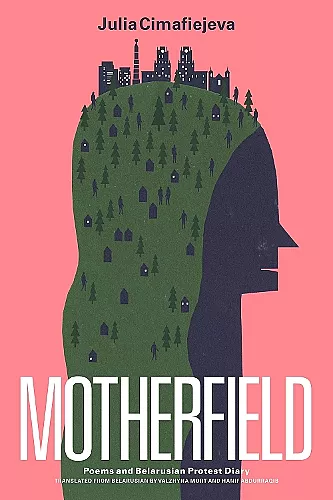Motherfield
Poems & Belarusian Protest Diary
Julia Cimafiejeva author Valzhyna Mort translator Hanif Abdurraqib translator
Format:Paperback
Publisher:Deep Vellum Publishing
Published:5th Jan '23
Should be back in stock very soon

Outreach and publicity via translators’ networks and social media Serialization outreach targeting The New Yorker, Granta, Poetry, The Nation, Paris Review, Astra Magazine, BOMB, Electric Literature, Literary Hub National review and feature outreach to print publications (NYTBR, New York Times, New Yorker, Wall Street Journal, Washington Post, LA Times, Boston Globe) and online (NPR, Literary Hub, Buzzfeed, The Millions) Targeted outreach to fans and champions of translated literature: World Literature Today, Asymptote, Words Without Borders, Calvert Journal Virtual events featuring author and translators Promotion at/events pitched to Brooklyn Book Festival, Texas Book Festival, PEN World Voices Promotion on the publisher’s website (deepvellum.org), Twitter feed (@deepvellum), and Facebook page (/deepvellum); publisher’s e-newsletter to booksellers, reviewers, librarians
A poetry collection where personal is inevitably political and ecological, Motherfield is a poet’s insistence on self-determination in authoritarian, patriarchal Belarus.
Julia Cimafiejeva was born in an area of rural Belarus that became a Chernobyl zone when she was a child. The book opens with a poet’s diary that records the course of violence unfolding in Belarus since the 2020 presidential election. It paints an intimate portrait of the poet’s struggle with fear, despair, and guilt as she goes to protests, escapes police, longs for readership, learns about the detention of family and friends, and ultimately chooses life in exile.
But can she really escape the contaminated farmlands of her youth and her impure Belarusian mother tongue? Can she really escape the radiation of her motherfield? This is the first collection of Julia Cimafiejeva’s poetry in English, prepared by a team of co-translators and poets Valzhyna Mort and Hanif Abdurraqib.
Longlisted for the 2023 PEN Award for Poetry in Translation
Shortlisted for the 2022 Derek Walcott Prize for Poetry
"The language I wish to speak / isn't contained in words," writes Julia Cimafiejeva, while giving us these moving words of witness and testimony, compelling poems of kinship, of bravery and fear and reckoning: "we came back for a visit," she writes, "only cemetery crosses / waved at us with rags / of their embroidered towels." There is so much lyricism in this painful reckoning, the language itself uplifts even as it doubts itself in a time of great upheaval: "I approach the territory of a foreign language / as a melancholy spy / I must steal a secret / of these strange hills." Poetry here doesn't just survive despite translation between languages, but because of it. And for that, my special gratitude is to Cimafiejeva's brilliant translators, Valzhyna Mort and Hanif Abdurraqib. The horrors of reality in today's Belarus, the beatings and tortures of prisoners, the eerie presence of Chernobyl disaster in these pages, all true, all heart-breaking, and all also somehow carried through to us by beautiful, memorable, unrelenting words.” —Ilya Kaminsky, author of Dancing in Odessa and Deaf Republic
“Julia Cimafiejeva’s Motherfield is a minefield of memory. I close my eyes, recall the events that unfolded in my own country in 2020 and 2021. The similarities of our recent histories—the stun grenades, rubber bullets, beatings, and detentions—are striking. Still, there’s no mistaking Motherfield’s singularity, which is to say Cimafiejeva’s dexterity.” —Nicole Sealey, author of Ordinary Beast
"A dual-language publication, Motherfield reads like a testament to the innate multilingualism of Belarus. And after all, what Belarusians say matters just as much as what language they say it in. In Motherfield, Cimafiejeva has proved herself to be a bad student of fear. She wields her flexed, forceful verses like that mightiest of muscles — the tongue." —Jennifer Wilson, The New York Times Book Review
"A devastatingly beautiful and essential read." —Pierce Alquist, Book Riot
"Motherfield is a forceful diptych pairing the poet’s protest diary (spanning the period from Belarus’ 2020 presidential election to March 2021, after the poet has settled in Austria) with poems flowing from days full of fear and hope." —Layla Benitez-James, Harriet Books (Poetry Foundation)
"Offering historical, political, and personal context to the poems that follow it, the diary is an activist’s account, but it is also a poet’s account; some of its moves and images linger and react with the poems’ more distilled elements…In the end the speaker keeps a 'beaten hope' that 'builds its nest / On my roof and sings / In Belarusian.' This poem, unlike others, is dated: August 5, 2020, just before the election, before the crackdown, before the president remained, again, in power. The beginning is at the end, enacting the cyclical nature of the “beaten hope” the poem names…[I]f Motherfield’s final poem relies on the protest diary for context, the poems that precede it—their images of wordlessness, thwarted regeneration, and ecological catastrophe—give the book its depth, and announce Julia Cimafiejeva as a poet that English language readers will want to follow in the future." —Jessica Johnson, Rain Taxi
"This book is a sword; its poems cut through so much clutter to the white-hot wire of social, political, and personal injustice—warranted, searingly expressed, and yet somehow also nondogmatic, intuitively right, and artistically original. These poems speak volumes; to an astute reader, they can also serve as a warning. It is a voice that deserves and rewards our attention—hopefully you can give it yours." —Andrew Singer, World Literature Today
ISBN: 9781646052257
Dimensions: unknown
Weight: unknown
280 pages